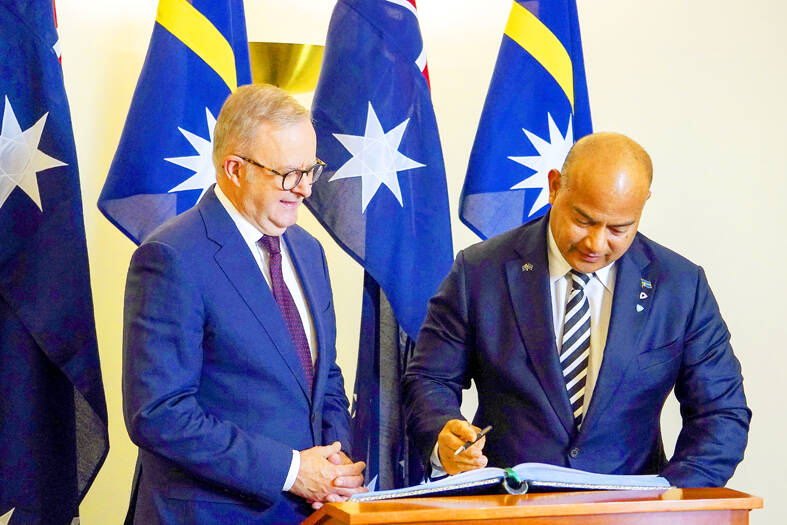Australia yesterday struck an economic and security treaty with Nauru, pledging A$100 million (US$65 million) in direct budget support over five years and A$40 million to boost security in the remote Pacific island nation that is also being courted by China.
It is the second security deal Australia has made in the Pacific Islands that effectively blocks China from forming policing ties after a similar deal agreed with Tuvalu, and gives Canberra a veto over Chinese involvement in Nauru’s security, banking or telecommunications sectors.
Concern in Canberra about Beijing’s ambitions in the Pacific islands grew after the Solomon Islands struck a security deal with China in 2022, and China test-fired an intercontinental ballistic missile with a dummy war head into the Pacific Ocean in September.

Photo: AP
A Chinese space tracking vessel was sailing northwest of Nauru at the time of the launch.
Under the treaty, Nauru must notify and gain agreement from Australia before Chinese navy vessels use its main port, which was recently upgraded by a Chinese state company.
The new deal prevents third countries from accessing Nauru’s critical infrastructure for security purposes, Australian Prime Minister Anthony Albanese and Nauruan President David Adeang said at a joint media briefing.
Australia will commit to ensuring Nauru’s banking service, and provide budget support for education, health and other needs.
The deal “will strengthen Nauru’s longer-term stability and economic resilience. It is also firmly in Australia’s interests in a peaceful, secure and economically resilient Pacific region, the region that together we call home,” Albanese said.
Albanese said Australia would remain Nauru’s primary security partner, and pledged fresh investments to support the nation’s policing and national security needs.
“We appreciate Australia’s steadfast support as we try to address our unique development challenges while we continue diversifying our economy, exploring innovative opportunities and safeguarding our region’s peace and stability,” Adeang said.
Nauru is the world’s third-smallest country and uses the Australian currency. In January it switched diplomatic ties to China from Taiwan, and the Bank of China later signed an agreement to explore opportunities there.
Under yesterday’s deal the Commonwealth Bank of Australia is to gain an exclusive right to offer banking services, filling a gap left by the exit of Australia’s Bendigo and Adelaide Bank next year.
Australia operates a Regional Processing Centre for asylum seekers in Nauru that is forecast to contribute about US$135 million in government revenue in 2024 to 2025. An Australian official said the treaty was unrelated to the asylum seeker center.
Nauru said in a statement on Facebook yesterday that it is exploring an air services agreement with China to boost its international airline connectivity.

NEXT GENERATION: The four plants in the Central Taiwan Science Park, designated Fab 25, would consist of four 1.4-nanometer wafer manufacturing plants, TSMC said Taiwan Semiconductor Manufacturing Co (TSMC, 台積電) plans to begin construction of four new plants later this year, with the aim to officially launch production of 2-nanometer semiconductor wafers by late 2028, Central Taiwan Science Park Bureau director-general Hsu Maw-shin (許茂新) said. Hsu made the announcement at an event on Friday evening celebrating the Central Taiwan Science Park’s 22nd anniversary. The second phase of the park’s expansion would commence with the initial construction of water detention ponds and other structures aimed at soil and water conservation, Hsu said. TSMC has officially leased the land, with the Central Taiwan Science Park having handed over the

The Philippines is working behind the scenes to enhance its defensive cooperation with Taiwan, the Washington Post said in a report published on Monday. “It would be hiding from the obvious to say that Taiwan’s security will not affect us,” Philippine Secretary of National Defense Gilbert Teodoro Jr told the paper in an interview on Thursday last week. Although there has been no formal change to the Philippines’ diplomatic stance on recognizing Taiwan, Manila is increasingly concerned about Chinese encroachment in the South China Sea, the report said. The number of Chinese vessels in the seas around the Philippines, as well as Chinese

URBAN COMBAT: FIM-92 Stinger shoulder-fired missiles from the US made a rare public appearance during early-morning drills simulating an invasion of the Taipei MRT The ongoing Han Kuang military exercises entered their sixth day yesterday, simulating repelling enemy landings in Penghu County, setting up fortifications in Tainan, laying mines in waters in Kaohsiung and conducting urban combat drills in Taipei. At 5am in Penghu — part of the exercise’s first combat zone — participating units responded to a simulated rapid enemy landing on beaches, combining infantry as well as armored personnel. First Combat Zone Commander Chen Chun-yuan (陳俊源) led the combined armed troops utilizing a variety of weapons systems. Wang Keng-sheng (王鏗勝), the commander in charge of the Penghu Defense Command’s mechanized battalion, said he would give

AUKUS: The Australian Ambassador to the US said his country is working with the Pentagon and he is confident that submarine issues will be resolved Australian Ambassador to the US Kevin Rudd on Friday said that if Taiwan were to fall to China’s occupation, it would unleash China’s military capacities and capabilities more broadly. He also said his country is working with the Pentagon on the US Department of Defense’s review of the AUKUS submarine project and is confident that all issues raised will be resolved. Rudd, who served as Australian prime minister from 2007 to 2010 and for three months in 2013, made the remarks at the Aspen Security Forum in Colorado and stressed the longstanding US-Australia alliance and his close relationship with the US Undersecretary